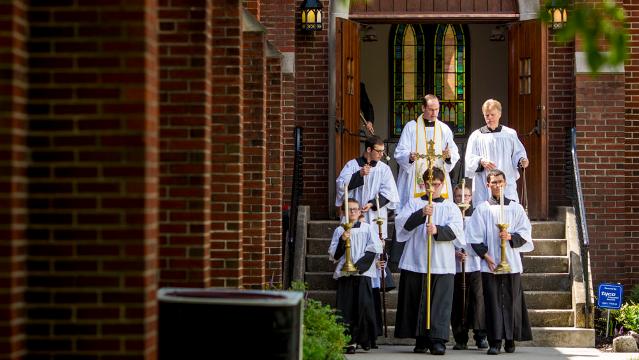
Ed Miller won’t stop talking.
Anyone who knows him will tell you this is normal, but it makes me nervous. Because Ed is also driving. I’m in the backseat, and he keeps looking in the rearview mirror. Staring past a white cross and rosary beads, he is explaining the traditional Roman Catholic Mass while swerving to avoid birds in the road.
“It is not a happy time,” he says.
In Ed’s mind, Sundays should not be fun. Mass is something to be taken seriously. Something solemn. Because this isn’t a matter of life and death. This is life and whatever comes after life.
When I rang the doorbell 15 minutes earlier, no one answered. Eventually, Ed greets me with beads in his hand. He is wearing a white dress shirt with black pants. A suit jacket hangs in his SUV. He looks a little bit like comedian Bill Maher, a comparison he would surely detest, even though the two probably agree on the absurdity of so-called cancel culture.
Ed Miller is a devout Catholic. In his mind, most Catholics aren’t real Catholics. They’re cafeteria Catholics, people who pick and choose what they want to believe, instead of following all church doctrines. He used to be one of those people, so that’s why he talks like this.
Because he isn’t the one judging. God is.
'Fake Catholic' or devout Catholic? Why Joe Biden's Cincinnati visit divided the faithful
On our way from Green Township on Cincinnati’s West Side to Park Hills, Kentucky, just across the Ohio River, we pass six Catholic churches. Ed points them all out, suggesting one will be closed in four or five years. He points to another, lamenting the loss of a Catholic school that once operated there.
“The Catholic church is dying,” he says.

We are headed to Our Lady of Lourdes, one of the few parishes in the region to still conduct Mass in Latin – a parish that would not even be allowed to exist if it were created today. The priests here wear cassocks, the formal black uniform with a white collar, even when they’re at a neighborhood barbeque. During Mass, these priests don’t face the congregation. They face God.
The congregation does not sing or do anything except kneel and pray and take communion on their tongues. Some call the Latin Mass the “extraordinary form.” People have moved from as far away as Florida and Seattle for this weekly Sunday Latin Mass, which used to be commonplace in parishes before the 1960s but has become controversial and is being restricted.
On Sundays, Ed usually recites the rosary on his way to church, but today he is telling me about the Catholic faith. The way he believes it should be taught. The way he was never taught until he was 50 years old.
In Ed’s mind, the Catholic church is under attack. And the uncertain future of Latin Mass is just one example of this. That means Ed is at war. With everyone and everything. He is worried. About what I will write and about the world at large. Because in his mind, we are all nearing the end.
And there will be great suffering.
‘You’re coming back, right?’
Ed Miller is already suffering.
Since becoming what he calls a “trad,” or a traditional Catholic, in 2012, Ed has lost friends. Beyond friendship, his relationships with his kids have also deteriorated. Because the closer he gets to God, the closer he wants – no, demands – others to get as well.
“Thanks for ruining my life,” he tells the former atheist who converted him to this strict brand of Catholicism. “And for saving my soul.”

Only one of Ed’s three biological children go to church, none of his siblings do, and no one other than his wife goes to a traditional Latin Mass like him.
“I tell my daughter: ‘Honey, I love you. But if you were to die right now you would go to hell.’”
As Ed walks up to the large wooden doors of his parish, he points to a sign by the entrance addressing appropriate attire. Women are encouraged to wear dresses below the knee, and men should wear pants and shirts with ties. Most women cover their head with veils. Ed likes to say his church looks like “Little House on the Prairie,” because it’s better than what else they’ve been called: a cult.
When we go inside, Ed says, he won’t talk. He even pantomimes zipping his mouth shut. Then, he dips his hand in holy water and proceeds to narrate much of Mass for me. During the rosary, Ed’s voice seems to get louder when repeating a line about “the fires of hell.”
When the priest enters, Ed bows.

It’s almost 11:30 a.m. when a young man sits in our pew. Ed’s wife moves so he can sit next to the boy. Ed gets out his Bible, which is half Latin and half English, flipping to relevant passages for him. There are times when Ed explains something to me, then leans over and whispers the same thing to this young man, who wears an orange bracelet that reads: “What color is God?”
'We lost what we cherished': Cincinnati parish fights back when a new priest brings change
Ed is trying to help the boy, a friend’s son. It is obvious this young man does not usually worship here. He normally attends Crossroads. In the parking lot afterward, Ed asks the young man what he thinks of Mass.
“It was alright,” he says in a way that makes it clear this is not what he really thinks.
“You’re coming back, right?” Ed says.
“I’ll have to think about it,” the young man responds.
“See you next week,” Ed says.
The Catholic salesman
I called to talk about movies.
This was in December. I wanted to speak to theater owners about the precarious outlook of their business. Ed Miller owns a small movie theater in Sayler Park, but he never seemed very interested in talking about that. He just wanted to talk about religion.
But there was one movie he would discuss. It was something of a rarity at the Parkland Theatre: An R-rated film, "Infidel."
To Ed, and his Catholic sensibilities, even most PG-13 films are problematic. His priest once walked into his theater and pointed at the posters on the wall, calling each one demonic and immodest.
Then, he told a young employee to take off his hat.

Actor Jim Caviezel is most famous for playing Jesus in the “Passion of the Christ.” If you believe Ed, Caviezel was banished from Hollywood because of that film and his Catholic faith. That’s why Ed made an exception to his rule against R-rated films to show “Infidel,” which stars Caviezel as an outspoken Christian journalist imprisoned after he tells a Muslim audience in Iran, “Jesus is God.”
Instead of movies, Ed is more excited to tell me about a banner hanging inside his theater. It’s the history of the Catholic Church, he says. The real history. And it hangs directly across from what he calls the “wall of sin,” where there are pictures of Elvis Presley and Hollywood stars.
Ed grew up on Cincinnati’s West Side, a popular wrestler at Oak Hills High School. He comes from what he calls an alcoholic family and says he never drank anything other than champagne during a wedding toast. In high school, he lost friends because of this. He says it prepared him for the battle over faith he finds himself in now.
Tom Tierney, Jr. has known Ed since 1980 when they worked together as computer programmers. Back then, Tom didn’t think of Ed as a religious man. He knew him as something of a clean freak who enjoyed playing basketball and softball. He knew him as someone with thick skin who never did anything halfway, someone who cussed like a sailor and hosted big summer parties at his home in Green Township.
Over the years, Tom says, those parties have turned into gatherings for his church friends.
Tom was raised Catholic. A church organist when he was younger, he regularly played three Masses each weekend. These days, he might go to church once or twice a year. Ed mentions this anytime they see each other, which was as recently as two weeks ago.
“He pretty much reminds me on a regular basis I’m going to hell,” Tom says.
Sometimes, that means text messages with flame emojis. He says Ed is a little hardcore for some, but described him as a good person who isn’t mean-spirited.
“If you’re not Catholic, he’s going to try to make you one,” Tom says.

Ed says he always wanted to be a good Catholic. But he didn’t truly know what that meant until recently. The way he tells it, because of Vatican II in the 1960s, Catholic leaders met to discuss the church’s place in the modern world. As a result, the church introduced a new set of operating principles, encouraging friendship with non-Christian faiths, allowing for prayer with other Christian denominations and encouraging Mass in local vernacular.
The Catholic church was evolving. But not everyone wanted to evolve with it.
Faith and the coronavirus: Religious Cincinnatians try to stay together while being apart
This was the church Ed grew up in. But when he was 50, divorced for a second time, he met Ken Zalewski at work. Ken, who was playing drums in a rock band when he found God on the radio, kept staring at Ed during a meeting. Afterward, Ken asked if he owned a movie theater.
The two men began talking about faith, about the state of the world and about what it meant to be Catholic. It wasn’t what we’ve been taught, Ken told him.
Ed wanted to know more. He started studying more than three hours a day, watching YouTube videos about doctrines of the church. He became angry. Because he came to believe if he died, he would go to hell.
And he came to believe he had failed as a parent.
Ed’s life, which always involved faith, soon became defined by it. If invited, Ed will attend a Catholic wedding that isn’t performed in Latin. But afterward, he recites the rosary to apologize for “what we did to His service.” Before he goes on vacation, Ed researches the closest Latin Mass. If there isn’t one, he plans a trip somewhere else.
At his theater, where an ancient Catholic chant plays before movies start, Ed shows me the banner he kept talking about. It is a timeline with popes and wars and saints. At the bottom, it lists enemies of the church. Some of these enemies include: Crossroads Church, Sigmund Freud, Big Bangism, Margaret Sanger and Quakers.
Looking at the banner, Ed slaps the wall beside it, where the timeline last mentioned the collapse of Western civilization.
“We’re at end times,” he says.
‘A lot of people hate me’
There are a lot of reasons to dislike Ed Miller.

His deceased sister was gay, but if you ask him, she was just brainwashed by Hollywood. The less said about his views on Jews or reparations or the NBA the better. Every time he brings up former President Barack Obama, I cringe. Not necessarily because of what he says, but because of what I’m afraid he’ll say next.
Ed once made a bank teller cry when he found out she lived with her boyfriend. His friend Tom jokes it would have been less traumatic for the employee if a bank robber walked in instead.
“A lot of people hate me,” Ed says.
But calling him an overbearing zealot would be missing the point. Ed says the Latin Mass is the only part of the Catholic faith that is growing.
Despite this, Pope Francis recently said this Mass has divided and injured the church. And now, the man who Catholic dogma holds infallible as a teacher of the faith is trying to restrict the Latin Mass. In Ed’s mind, it seems like there is no room in the modern world for traditional values and beliefs.
He is not alone.

The Chicago-Sun Times called this a defining moment for Pope Francis, while the New York Times wondered if it would show the limitations of his powers. A priest in Walton, Kentucky, cried while telling his church recently he could no longer celebrate Mass in Latin.
In a way, Ed is a symbol of a divided America. To some, he stands in the way of progress. To others, he protects society from itself. During a recent sermon at Ed’s parish, the priest asks the faithful to imagine a newspaper headline: “Cancel culture cancels beads.”
The priest asks those gathered in front of him to imagine a world where the pope tells them to stop reciting the rosary. It would be ridiculous, he says.
Now, the pastor says, imagine getting rid of the historic ritual of Latin Mass, something celebrated by the most devout Catholics for centuries. Except today, those headlines are very real.
“It’s time to defend the church,” the pastor says.
Hope, children and ‘coexist’
St. Augustine was a heathen. Born in Africa, his family only spoke Latin at home. Raised Christian, he left the faith and fathered a child outside of marriage.
“Grant me chastity and continence, but not yet,” he famously said.
Eventually, St. Augustine wrote a book that served as a guide for how to convert to Catholicism. It’s easy to see why Ed likes him. Not because Ed sees himself in St. Augustine, but because he sees himself in the saint’s mother, who prayed every day for her son to return to the faith.
Her prayers were answered, and Ed hopes one day his will be, too.
Ed mentions this saint during a Zoom presentation last month. He was scheduled to speak at a Norwood church in June. “No salvation outside the Catholic church,” was the title of his talk. But several people at the church complained, and the day before the event, it was canceled.

Instead, he gave the lecture to about 20 people over Zoom, where he often stumbled over some of the Latin names and phrases he referenced. To make his point, which he would tell you is not his point, but God’s point, he used a version of the “Coexist” logo. This is a logo with multiple religious symbols promoting peace and understanding.
In Ed’s PowerPoint, a sword cuts through the middle of those symbols.
Ed had invited his youngest son, a 21-year-old at the University of Cincinnati, to the presentation. He didn’t attend.
None of his children did.
A prayer for humility
Ed's father was a realtor, a recognizable name on the West Side. Ed called his dad a “slick salesman,” and he has certainly inherited this trait. The 59-year-old refers to his house as a compound and tells me he prays for humility every day.
Deliver me, Jesus. From the desire of being honored. Deliver me, Jesus. From the fear of being despised. Jesus, grant me the grace to desire it. That others be praised, and I be unnoticed.
Before Mass, I told Ed’s wife I went to a Lutheran church growing up. In the car after Mass, Ed tells me those who have been baptized and leave the church suffer more. I ask if that means his kids will suffer more.
It does, he says.
“So will you,” his wife says.
She doesn’t say this in a mean way. Jenny Miller is often the one who tries to soften her husband when he is talking about topics like same-sex marriage. She was 8 years old when her family left Vietnam, and she spent a year in a refugee camp before moving to the United States. When her family settled in Dayton, Ohio, she began attending Catholic school.
An engineer, she speaks three languages and married Ed in 2015, a few years after her first Latin Mass. She says her favorite thing about her husband is his devotion to the faith. And yes, their wedding ceremony was in Latin.
“Has your son been baptized?” Jenny asks in the car.
“No,” I say.
For the first time in eight months since I called to discuss the future of cinema, Ed Miller stops talking. Back at home, he says he will pray for me.
‘Marry a devout Catholic’
The first Latin Mass Ed ever attended came during a Bengals bye week.
He had resisted for months, because he didn’t want to miss the start of a football game. This was what gave him the most joy in life. Not God, but Carson Palmer.
The basement of the home he bought when he was 28 years old shows this. His parents didn’t want him to buy it, but he says he was attracted to the property because gaudy pillars at the front entrance made it look like a mafia home.

He gives me the tour, which includes one room where no one is allowed to sit on the furniture. At the front of the house, between the pillars, are two angel statues with gold wings. By the pool in the backyard is a 750-pound statue of Jesus. It stands next to an air conditioner.
Ed is walking through his barn, which has a basketball court, a Donald Trump yard sign and movie theater seats when he asks if I know what the three keys to a lasting marriage are.
“Marry a devout Catholic,” he says.
“Marry a devout Catholic,” he repeats.
You can guess what he said next.
Ed’s previous two marriages were annulled, he explains. And he largely blames their failure on his ex-wives. He tells me he met Jenny on Catholicmatch.com, and he knows this marriage will last.

In the basement, which he saves for last, there is a bar and sports memorabilia all over the walls. Ed spends a great deal of time explaining the significance of each piece. He was a batboy for the Cincinnati Reds, he tells me, and his dad was friends with Pete Rose. One story Ed tells involves how much of a jerk Johnny Bench was. He’s in the middle of another story when his youngest son calls. Ed tells him he’s busy.
Then, he asks if he wants to come to Mass. It starts in about an hour. His son, who memorized the Latin Mass after several years of going to church with his father, sounds exasperated. He sounds like he has heard this before.
“I have to work,” he says.
There is a pause.
“So, we’ll plan on Sunday?” Ed says.
His son laughs. Then, without saying anything else, he hangs up.
Source link








